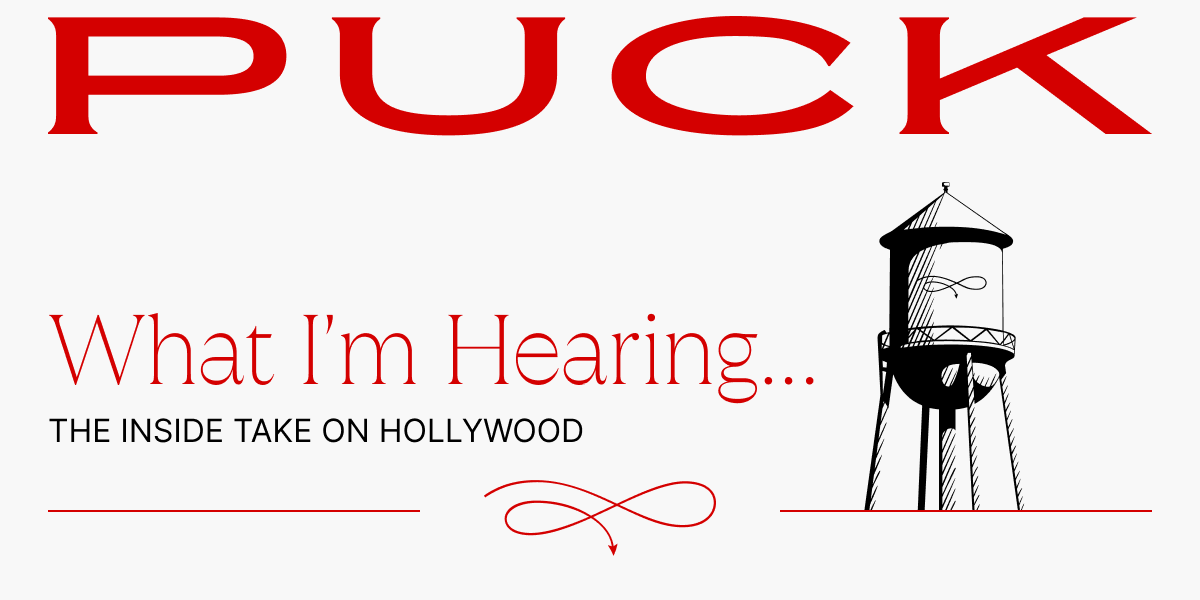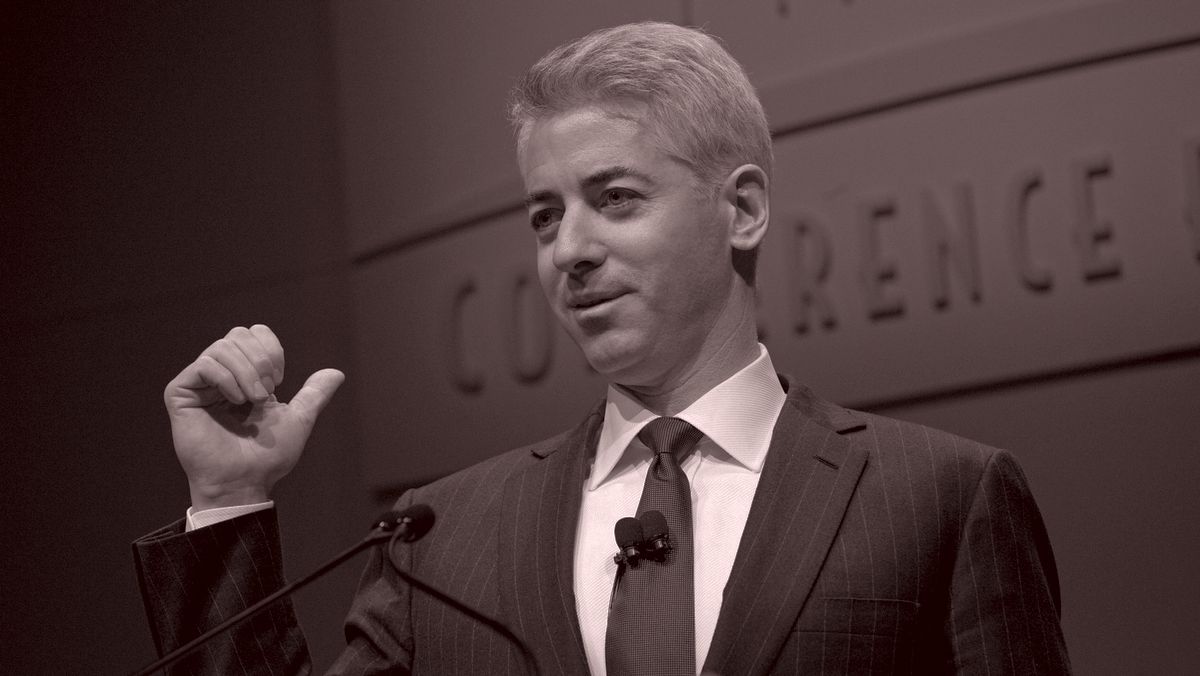Welcome back to What I’m Hearing. Earlier tonight, I did a speaking thing at the UCLA film school. I’ll also be in Palm Beach next week for an analyst talk. Let me know if you’re sunning yourself there and would like to meet up.
Tonight, changes at one of Hollywood’s most powerful law firms, and my analysis of the troubles plaguing one of the biggest players in film finance. Plus: some Tom Cruise bundt cake news.
But first…
🚨🚨Oscars ratings winner!: Big congrats to Alvaro
Saracho, an exec at production outfit The Immigrant, who guessed 19.35 million, just under the 19.69 million Live+Same Day viewers on ABC and Hulu, per Nielsen. Pretty close! Alvaro is getting some status-defining Puck merch and the Wicked doll with the special error. Thanks to the hundreds of readers who submitted.
Not a Puck member? Just click here. Got a news tip or an idea
for me? Just reply to this email or message me on Signal at 310-804-3198.
Let’s begin…
|
Speaking of Oscars ratings…: The Academy sent an email to members today boasting about
the 1 percent year-over-year uptick in viewership for the Oscars. A couple (cynical) members forwarded the note to me with comments mocking the great success! tone of the missive… but honestly, a gain is certainly better than a decline, and the demo increases—up 19 percent in adults 18-49 and 28 percent in adults 18-34—are meaningful. I’d say the streaming debut for the Oscars on Hulu had much more to do with those upticks than host Conan O’Brien, the nominated
movies, or anything that happened during the show. And the glitches on Hulu didn’t seem to prevent the digital broadcast from juicing online chatter (maybe the complaining helped), with the Academy claiming to have beaten both the Grammys and Super Bowl in social interactions. I’m a bit dubious, but given the high-stakes talks with Disney (and potentially Netflix) about a new broadcast deal, even slightly good news is great for the Academy right now.
Skip Brittenham and Sam
Fischer are retiring: A generational shift is afoot at the powerful Ziffren Brittenham entertainment law firm. Skip Brittenham, the dealmaking legend (a word I don’t throw around lightly) who has repped stars like Harrison Ford and Eddie Murphy and was a key player in the creation of DreamWorks and Disney’s acquisition of Pixar, is officially retiring. So is Sam Fischer, another major Ziffren Brittenham talent
lawyer and former managing partner, who has long repped Ben Affleck, Matt Damon, Greg Daniels, and many others.
This has been in the works for a while, and Brittenham’s and Fischer’s clients have been transitioning to other lawyers at the firm. Bryan Wolf—who has taken the lead on Skydance, for instance—is the new managing partner, and David Lande, the well-known music attorney, is getting more leadership
responsibilities. The firm name isn’t changing, a sign that it takes a more institutional approach to its practice than some of the other, more individual-based talent firms with 10 names on the door.
Ken Ziffren, the firm’s other namesake, isn’t going anywhere, nor is Cliff Gilbert-Lurie, the former managing partner, who reps Dick Wolf. Lately, Ken has been quietly involved in the push to increase the California tax credit for film and
TV productions. He told me today that Skip, with whom he started Ziffren Brittenham back in 1978, “changed the way we represent and care for clients and transformed an industry for the better.”
Box office over/under: Mickey 17, Warner Bros.’ oft-delayed, $120 million Bong Joon Ho sci-fi comedy, is tracking for just $20 million in the U.S. I’ll take the under, based on weak-ish presales. More worrying, the global numbers look soft, too.
Okay,
now on to the whole Village Roadshow shitshow…
|
|
|
A pioneer of film finance that had its hand in everything from ‘The Matrix’ to the
‘Ocean’s’ movies is teetering on insolvency amid a crippling legal fight with Warner Bros., private equity management, and the industry slowdown that has claimed other Hollywood players.
|
|
|
Everyone knows that investing in the movie business is a sucker’s bet. So many supposedly sophisticated
financial backers—the Japanese, the Germans, the French, the insurance money, the re-insurance money, the dot-commers, the hedgies, and lately, the Koreans—have arrived in town with visions of glamor and riches. Few have actually made money.
Yes, there are outliers. Kevin Ulrich, whose Anchorage Capital owned MGM for a decade, was bailed out by an overeager Amazon in 2021. Steve Mnuchin, the investor turned Trump 1.0 Treasury secretary, did fine
on his 2000s-era Dune fund, which has a stake in Avatar, but he is said to have lost a ton on a separate deal with Ryan Kavanaugh. Generally, most rich guys leave Hollywood just like wannabe actors from Kansas: humbled, with less money, but maybe a couple fun stories to tell back home.
Jim Moore is trying really hard not to end up that way. Moore is the embattled C.E.O. of Vine Alternative Investments, the private equity firm that owns film
finance and production outfit Village Roadshow Entertainment Group. At this point, Village Roadshow has become notorious around town for all the reasons that have made the past few years so depressing in the entertainment business: The high-flying slate finance company, once the envy of the industry, moved headlong into producing its own movies and shows, got over its skis a bit, descended into an expensive and protracted legal fight with its biggest partner, Warner Bros., and ended up teetering
on the brink of collapse in the aftermath of Covid and the strike-related content recession. In December, the Writers Guild issued a rare “Do Not Work” order against Village, citing scores of unpaid members. Not great.
Moore has struggled to pay bills and has been effectively sidelined by his board as they furiously seek a buyer for a library of more than 100 studio films that has been valued at around $400 million. Industry veteran Steve Mosko, Village Roadshow’s top
executive, either hit the eject button or was ordered to do so in January after trying and failing to sell the assets. It’s now a race to make a deal before the whole company falls into bankruptcy. If that happens, it’ll mean the death of one of the last independent studio players in Hollywood, and a sad commentary on the state of the industry in 2025.
So of course I needed to give Jim a call. “One of the goals with this company—and with Vine in general—is, I don’t want to burn any
bridges,” Moore insisted during our chat. “I still believe in the history of these two companies, and I think there’s a path forward. We can see our way around a couple curves. It’s just different. The economics of the industry are different. Everything’s different.”
|
The Village Roadshow saga is actually pretty interesting and instructive. The company goes back decades,
starting in Australia, and was a pioneer in turning movies—and the cash they throw off for decades after their theatrical release—into an institutional investment strategy. In the late ’90s, Warner Bros. co-chairs Bob Daly and Terry Semel needed money to make the kind of expensive tentpole movies that audiences were starting to demand, so they had the late dealmaker Jim Miller architect an arrangement with Village to finance more than just a
one-off movie here and there. Then-C.E.O. Bruce Berman, who came from Warners, helped turn this into an ongoing relationship: Village and Warners co-financed the budgets of a “slate” of movies that Village opted into and would co-own. That structure seems normal now—studios regularly bring in slate partners on multiple movies. But the Village co-fi deal was unique at the time and particularly rich.
Village, for instance, could pick and choose the movies it put
money into—and, crucially, the ones it didn’t. And if it passed on a Warners hit, a sequel would still be fair game—which is unheard of in today’s co-finance deals, where if you pass on Barbie, you can’t then muscle into Barbie 2. Plus, Village didn’t have to put up its money until the movie was actually released. In return, Warners got a reliable partner to take on some of the risk as the studio business became the tentpole business—so reliable that the two sides kept
extending the deal, and it eventually led to more than 100 co-owned movies, including blockbusters like The Matrix, Sherlock Holmes, The Lego Movie, Happy Feet, and the Ocean’s franchise.
Alas, like many arrangements in Hollywood, it was a great deal until it wasn’t. Warners hit a dry spell, the matter of which movies were available for investment became more contentious, and Village did a separate slate deal with Sony. By 2015, the company had
accumulated great assets but needed cash.
Enter Vine, which had done okay in entertainment by picking up various library assets, which is a relatively risk-averse business. But then Vine started lending to companies that were producing their own films and shows, like Luc Besson’s EuropaCorp and Lakeshore Entertainment. In so doing, it dramatically increased its risk profile. Will this movie eventually open big? Is this show a hit? Long story short, there
weren’t enough hits and the companies couldn’t service their loans. So instead of being a lender to Village, Lakeshore, and EuropaCorp, Vine eventually ended up owning all three—along with its investors, Falcon Investment Advisors and, eventually, the Ontario Teachers’ Pension Plan.
This was around 2017, 2018, when the AT&T people took over Warner Bros. No surprise: The phone company suits didn’t love the Village deal. Why, the Hollywood outsiders asked, should another company be
allowed to siphon money from the studio’s hit movies? They didn’t exactly appreciate that Warners would have never made The Matrix if it didn’t have Village as a backstop. At the same time, Moore essentially doubled down on his production strategy. He brought in Mosko, the former top Sony Television executive, with a plan to not only manage the Village library and passively co-finance movies, but use the profits from the movies that worked at Warner Bros., like Joker, to
produce its own film and TV, too.
Basically, the plan was to build a version of Lionsgate—take the money generated from a strong library and pour it back into original productions. But even amid Peak TV, Village couldn’t seem to get much going. They had a Nash Bridges reboot on USA and a College Bowl revival with the Mannings on NBC. That kind of stuff. (A Tic-Tac-Dough reboot is coming to Game Show Network this year.) But when Covid hit, things
really got challenging.
|
We don’t need to go too deep into the Warner Bros. litigation, but suffice it to say its impetus came in
late 2020, when WarnerMedia C.E.O. Jason Kilar infamously decided that he would put the entire 2021 Warner Bros. slate on HBO Max on the same day they debuted in theaters rather than delay the bigger-budget movies, as other studios had done. Moore and Mosko went berserk. They refused to pay Village’s share of the $190 million production budget for The Matrix Resurrections. (Remember, the Village deal required payment only upon release of the film.) Warners
brought an arbitration claim; Village countersued. Both sides hired $2,000-an-hour litigators. It’s a complicated case, but I’m told the arbitrator has so far determined that Village must pay its share for Resurrections, but the full scope of damages is still being determined following an appeal. (Mark Holscher, Village’s litigator at Kirkland, did not return my call, nor did Warners’ lead lawyer Dan Petrocelli.)
Some have speculated that Warner
Discovery saw an opportunity with the Matrix Resurrections dustup to escape or renegotiate the Village deal, which it has long hated. I could see that. (After all, C.E.O. David Zaslav used litigation against the NBA to extract some go-away money as that relationship ended.) Regardless, Village is now in a tough spot. The Warners case is dragging on, and few want to acquire a company whose main asset is tied up in litigation. In the meantime, Village is carrying tons of
employees (though many have left or been fired), development costs, and expensive office space—three things that don’t burden the balance sheets of most passive I.P. asset owners.
Last summer, Vine sold off some of its entertainment assets to Shamrock Capital, including the Lakeshore library, in a deal worth about $300 million, I’m told. But it still owns Village and EuropaCorp. And now there is further stink on Village due to the WGA “Do Not Work” order. It does seem silly that a company
with a $400 million library is refusing to pay a few million owed to its creative partners. But there isn’t much incentive for Moore—and more importantly, the representatives from Falcon, the Ontario Teachers, and other board members now calling the shots—to pay up if the whole goal is to get rid of the company and resolve the union issues in the sale.
That’s another interesting thing about the WGA action: Village is backed by another union, the Ontario Teachers. So one union has
a “Do Not Work” order against an entity supported by another union. A very odd situation.
|
Sifting Through the
Wreckage
|
Mosko, to his credit, made a valiant effort to sell the company, including the library and co-financing
rights, the derivative rights associated with those films, and the production company that he ran. For instance, I’m told Mosko had been negotiating with filmmaker Akiva Goldsman and backers from Octavian & Co. to take on Village, but that deal never closed. (A rep for Goldsman declined to comment.)
Moore told me other suitors have approached, and he is very open to making a deal. I’ll bet. Village has Goldman Sachs as bankers, and the usual suspects in the asset
management space would consider acquiring the Village library somewhat of a coup: Content Partners, Shamrock, Domain Capital Group—there are a bunch now. Given its background, I’d bet on Content Partners getting it. Mosko is said to be trying to buy the development slate separately to take to a new company. (He declined to comment.)
Overall, a pretty sad situation, and not just for Village and Vine. If Village bleeds out and enters bankruptcy, Warners would need to stand in line with
other creditors to get its money for Resurrections and potentially more, which wouldn’t be great for Zaslav or Moore. Meanwhile, the lawyers are running up huge bills. How is there not some kind of settlement to be worked out here? “At the end of the day, I had a vision to create a new independent production company, not just a co-finance company,” Moore told me. “But we started it literally months before the world shut down for Covid.”
That may be true, but Village
Roadshow’s woes also stand as a cautionary tale for Hollywood in 2025: A company that helped make some of the highest-quality and most successful studio movies of the past 30 years essentially wound up killing its golden goose. They took the money from the greatest co-finance deal in town and plowed it into a money-losing production business at exactly the wrong time. Will other entertainment companies learn from that mistake?
|
I’m sorry to report that Goldbelly, the specialty food delivery service, is now crassly capitalizing on
Tom Cruise to promote the famous Doan’s Bakery bundt cake that he sends to Hollywood people around the holidays. To its credit, Doan’s itself does not leverage Cruise’s name, referring to the cake on its profile page only as “the personal favorite of one famous actor.” But apparently the Goldbelly people couldn’t resist including the below promo in
their latest newsletter. Cruise’s lawyers have been notified.
|
See you Monday,
Matt
Got a question, comment,
complaint, or ‘White Lotus’ drinking games to better pass the time? Email me at matt@puck.news or call/text me at 310-804-3198.
|
|
|
Puck founding partner Matt Belloni takes you inside the business of Hollywood, using exclusive reporting and insight to
explain the backstories on everything from Marvel movies to the streaming wars.
|
|
|
Ace media reporter Dylan Byers brings readers into the C-suite as he chronicles the biggest stories in the industry: the
future of cable news in the streaming era, the transformation of legacy publishers, the tech giants remaking the market, and all the egos involved.
|
|
|
Need help? Review our FAQ page or contact us for assistance. For brand partnerships, email ads@puck.news.
You received this email because you signed up to receive emails from Puck, or as part of your Puck account associated with . To stop receiving this newsletter and/or manage all your email preferences, click here.
|
Puck is published by Heat Media LLC. 107 Greenwich St, New York, NY 10006
|
|
|
|





















